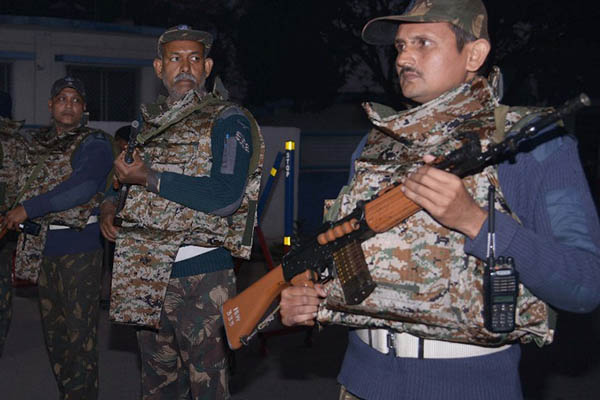
Narinder Nanu—AFP
United Jihad Council claims responsibility for attack in statement issued to media.
Indian troops backed by helicopters searched an air force base Monday after a weekend of fierce fighting with insurgents left seven soldiers dead.
The ongoing operation came as an umbrella group of jihadist outfits fighting in India-administered Kashmir, the United Jihad Council, claimed responsibility for the attack in a statement issued to the media.
“The attack on Pathankot air base is actually a message from the Pakistani mujahideen that no single sensitive Indian installation is out of their reach,” said spokesman Sayed Saqqat Hussain in the statement, which called on Delhi to grant self-determination to Kashmiri citizens.
Earlier Monday, a senior Indian security officer said a fifth attacker had been killed, in addition to four gunmen killed earlier at the Pathankot base in Punjab near the border with Pakistan. “We have been able to eliminate the fifth terrorist. The combing and search operations still continue,” the officer from the National Security Guard (NSG), a special forces unit, told journalists on condition of anonymity. He did not say what day the fifth attacker died.
The base was hit in a dawn raid Saturday that triggered a 14-hour gunbattle and there was more firing Sunday. It was not clear Monday whether any surviving attackers remained inside the base but troops were still searching.
Security officials said they were focusing on a two-storey building that contained living quarters for families on the base where the militants had previously holed up. “We are moving step by step to sanitize the area and it’s too early to say when the operation will be over,” said another military official who asked not to be named.
The NSG officer added that all assets at the base “including personnel and their families have been secured and are now safe.”
“As highlighted earlier, because of the magnitude of the air base, the operation will continue till we are able to fully render it safe,” he added.
The attack—a rare targeting of an Indian military installation outside disputed Kashmir—may have been intended to undermine improving relations with Pakistan after a landmark visit to the neighboring country by Indian Prime Minister Narendra Modi last month.
Finance Minister Arun Jaitley refused to comment on the impact of the attack on Modi’s peace initiative, after the premier’s surprise visit to meet his counterpart in Lahore. “The intelligence input really helped, which is why we could promptly stop them at a distance to contain and neutralize them at a distance from our strategic assets,” Jaitley told state broadcaster Doordarshan without giving details of its source. “The casualties of the security personnel are very unfortunate… the aim was to neutralize them or catch them without loss of assets.”
Before Monday’s claim of responsibility, security officials had suspected the gunmen belonged to the Pakistan-based Jaish-e-Mohammed, the group that staged the 2001 attack on the Indian parliament, which brought the two countries to the brink of war. It is not part of the United Jihad Council.
The United Jihad Council is currently headed by Syed Salahudin of jihadist group Hizb-ul-Mujahideen. An AFP reporter at the scene said sporadic gunshots could be heard inside the air base on Monday as army helicopters surveyed the site, but the reason for the shots was unclear.
Pathankot houses dozens of jet fighters and is located just 50 kilometers from the Pakistan border. Seven soldiers, including a lieutenant-colonel in the NSG, were killed and 20 injured in the assault.
